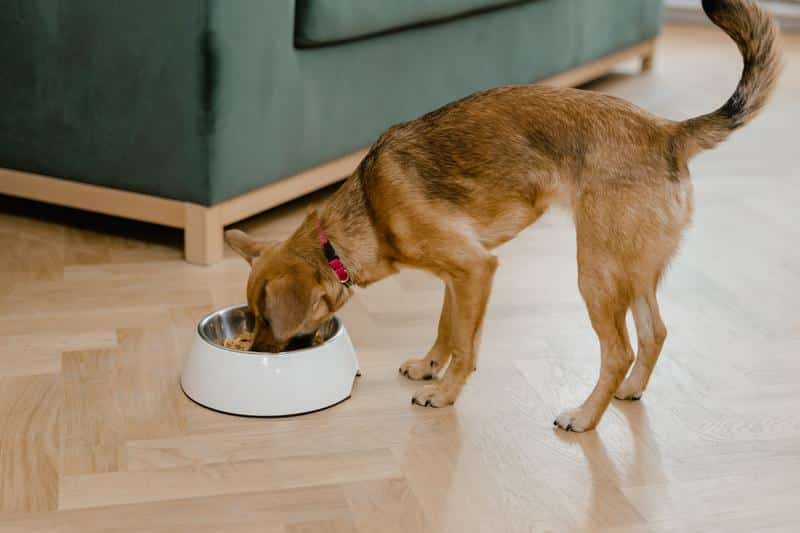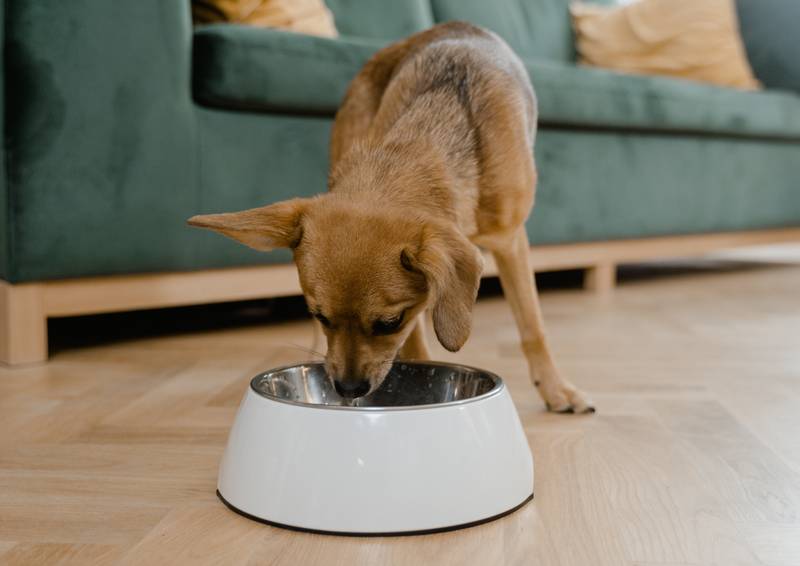Why Won’t My Dog Eat in Front of Me?
If you’ve ever wondered, “Why won’t my dog eat in front of me?” you’re not alone. It can be a baffling and worrying behavior, leaving you questioning what might be wrong with your furry friend. In this article, we will unravel the possible reasons for this behavior and provide tips to help your pet feel comfortable eating around you.
We’ll delve into scenarios such as sudden fear or potential health issues that could cause your dog to avoid eating in your presence. We’ll also discuss if this behavior could be a sign of aggression and whether puppies also exhibit this behavior.
With a deeper understanding of your dog’s eating habits, you can ensure they have a safe, comfortable dining experience. Ready to discover more? Keep reading below!
Dog Won’t Eat in Front of Me: How to Help Them

If your dog won’t eat in front of you, there are a few strategies you can adopt to help them feel more comfortable:
- Gradual Exposure: Try to sit further away from your dog during meal times, slowly moving closer over a period of days or weeks. This gradual exposure can help reduce their fear of eating in your presence.
- Create a Positive Association: You can build a positive association with meal times by offering treats or praise when your dog eats in your presence. This can help reinforce the idea that eating around you is a positive experience.
- Respect Their Space: Giving your dog some space during meal times might help. Try not to stare at them or make any sudden movements that might scare them.
- Understand the Root Cause: It’s crucial to understand the underlying cause of why your dog won’t eat in front of you. Common issues include anxiety, resource guarding, or previous negative experiences. Understanding these can help you tailor your approach to their specific needs.
These steps will get your dog to stop refusing to eat in front of you, but it’s important to remember that the underlying behavioral issues (anxiety, resource guarding) that were causing all of this to begin with will still be present. And until you address those, any positive changes you see are only going to be temporary.
“Well, how do I make them last then?”
By getting your dog to truly choose to follow your direction, that’s how. I tried many times to write out how you can do that before deciding it made more sense to just link you to the free video series that explains it better than I’d ever be able to.
The series is by a man named Dan who is one of the world’s leading dog obedience trainers. In it, he teaches you how to put an end to things like when your dog won’t eat in front of you and all other misbehavior using his fast and easy-to-follow methods.
In the first video, Dan will reveal to you why the two most common methods of dog training only doom you to failure. You can watch the video now by clicking here. Follow the proven system he’ll show you in his series and you’ll never have to spend another second worrying about your dog refusing to eat in front of you ever again!
Why Does My Dog Not Want Me to Watch Him Eat?

Your dog might not want you to watch him eat for a variety of reasons. Here are some possible explanations:
- Feeling Vulnerable: Eating is a vulnerable time for dogs because their attention is on their food and not their surroundings. They may feel uncomfortable being watched during this time.
- Guarding Resources: Dogs have a natural instinct to protect their resources, including food. If your dog feels they need to guard their food from you, they may prefer to eat alone.
- Past Experiences: If your dog has had negative experiences associated with food or eating in the past, they might not want you to watch them eat. This could include having food taken away, being disturbed while eating, or competing for food.
- Fear or Anxiety: Some dogs may feel anxious or afraid when they’re being watched, regardless of what they’re doing. This anxiety could extend to eating times.
- Preference for Solitude: Just like some people, some dogs might prefer to eat alone. This is simply a personal preference and is not usually a cause for concern unless it’s a sudden change in behavior.
Understanding the reasons behind your dog’s behavior can help you make meal times more comfortable for them. If your dog’s behavior suddenly changes or they show signs of stress or aggression when eating, you need to work to understand what’s happening to actually cause these feelings. Go back to the first section where we’ll explain how.
My Dog Is Scared to Eat in Front of Me All of a Sudden
A sudden change in your dog’s behavior around meal times can be concerning. If your dog suddenly seems scared to eat in front of you, consider these potential causes:
- Change in Environment: A recent move, a new pet in the house, or other changes in the home environment could make your dog feel anxious or insecure during meal times. They might also be hiding under the table, staying close and walking under your feet, or whining at night.
- Negative Experience: If your dog was scared or startled while eating in the past, they may associate eating in front of you with that negative experience.
- Health Issues: If eating causes your dog pain or discomfort, they may be reluctant to eat in front of you. Dental problems, digestive issues, or other health problems could be the cause.
- Resource Guarding: Dogs sometimes guard their food out of fear that it will be taken away. This behavior could suddenly appear if your dog feels threatened or insecure.
Any sudden change in your dog’s behavior can be a sign that something is wrong. If your dog seems scared to eat in front of you all of a sudden, you can go back to the first section of this article where we’ll explain more on addressing things.
My Dog Won’t Eat in Front of Me: Are They Sick?
If your dog won’t eat in front of you, it could be a behavioral issue, but it could also indicate that they’re not feeling well. Here are some signs that your dog might be sick:
- Change in Appetite: If your dog is not just avoiding eating in front of you, but also showing a general lack of appetite, this could be a sign of illness.
- Changes in Behavior: Behavior changes, such as increased aggression or fear, sudden lethargy, or excessive sleep, can indicate that your dog isn’t feeling well.
- Physical Symptoms: Physical signs like vomiting, diarrhea, weight loss, excessive thirst, or changes in urination can suggest that your dog is sick.
- Discomfort: If your dog seems to be in pain or discomfort while eating, they could have a dental issue or an internal health problem.
If your dog is showing any of these signs, it’s important to consult with a vet. While not wanting to eat in front of you could just be a preference or a behavioral issue, it’s always better to rule out any potential health problems. Remember, when it comes to your pet’s health, it’s always better to be safe than sorry.
If you feel none of these fit what’s happening with your dog, we address other possible explanations (and how to handle them) in the first section of this article.
My Dog Won’t Eat if I’m Watching: Is It Aggression?
If your dog won’t eat when you’re watching, it might seem like they’re showing signs of aggression, but that’s not always the case. Here are some things to consider:
- Resource Guarding: Some dogs may guard their food as a natural instinct. This can include behaviors such as growling, showing teeth, or eating more quickly when you’re near. While this might seem aggressive, it’s often rooted in fear or anxiety.
- Fear or Anxiety: If your dog feels anxious or afraid when you’re watching them eat, they might exhibit behaviors that can be mistaken for aggression. This could include avoiding eating when you’re present, running away with food, or acting nervous.
- Past Experiences: If your dog has had negative experiences related to food in the past, they might associate being watched while eating with those experiences. This could lead to behaviors that appear aggressive.
While these behaviors can seem aggressive, they’re often signs of underlying issues such as fear, anxiety, or insecurity. If your dog is showing signs of food aggression, it’s important to begin behavioral training right away. It can help you understand your dog’s behavior and provide you with the strategies for managing it in a safe and effective way.
Go back to the first section of this article now where we’ll explain how you can do that.
Why Does My Puppy Not Eat in Front of Me?
If your puppy doesn’t want to eat in front of you, there could be several reasons behind this behavior. Here are some possible explanations:
- Feeling Overwhelmed: Puppies are still learning about their environment, and having someone watch them eat might feel overwhelming.
- Guarding Resources: Even at a young age, some puppies may instinctively guard their food. This could cause them to feel uncomfortable eating while being watched.
- Adjustment Period: If your puppy is new to your home, they might need time to adjust to their new environment and routine, including meal times.
- Fear or Anxiety: If your puppy is anxious or fearful, they might not want to eat with an audience. This could be due to a variety of factors, including new experiences or changes in their environment.
- Health Issues: If your puppy is showing a lack of appetite or other signs of illness, they might not want to eat in front of you or at all. If you suspect a health issue, it’s important to consult with a vet.
Remember, puppies are just starting to learn about the world around them, and it’s normal for them to be a bit uncertain at times. Providing a safe, quiet space for your puppy to eat can help them feel more comfortable. And as always, if you have any concerns about your puppy’s behavior or health, it’s a good idea to consult with a vet.
I’m sure you’re looking forward to giving your dog the confidence they need to live a worry-free life, so I’ll let you get started. Good luck with everything, and thanks for reading this article “Why Won’t My Dog Eat in Front of Me?”





